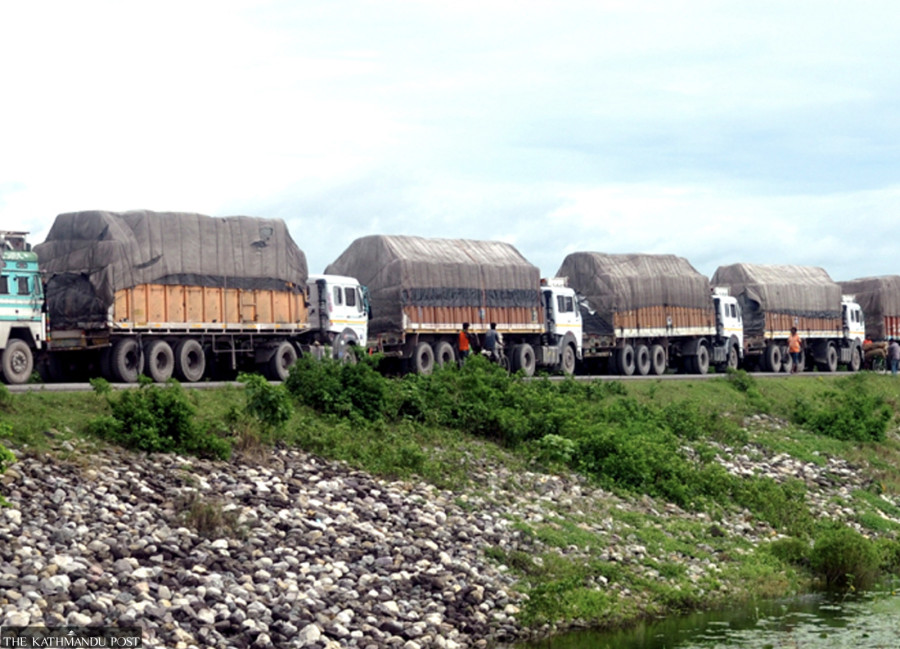Money
Nepal pilots online customs valuation system to boost trade transparency
The new database aims to speed up customs clearance, cut trade costs, and align Nepal with global trade facilitation standards, but experts warn implementation challenges remain.
Krishana Prasain
Nepal has started piloting an online valuation database in its customs system, a reform expected to benefit traders through faster and more predictable clearance, reduced trade costs, fairer valuation, simplified processes, and easier compliance in the trade-based economy.
Finance Minister Rameshore Khanal launched the online valuation database from the Biratnagar Customs Office on September 24.
An online valuation database in customs serves as a risk assessment tool that helps customs administrations verify the accuracy of declared values for imported goods. Such databases maintain records of recent customs values for previously imported items to flag potential under-declaration or over-declaration.
The World Customs Organisation (WCO) provides guidelines for developing and using such national databases. It has also introduced a comprehensive digital resource, WCO Trade Tools, which includes valuation information alongside the Harmonised System and Rules of Origin.
In June 2023, the Asian Development Bank (ADB) approved a $50 million loan to support Nepal’s implementation of policy reforms to improve domestic and international trade.
The ADB’s program supports the government’s ongoing Customs Reform and Modernisation Plan, which seeks to enhance customs processes by introducing digital technologies such as electronic payment of customs duties and fees, and electronic submission of export documents.
The initiative also involves setting up an online customs valuation database and reducing export documentation to speed up customs clearance.
According to Nepal Rastra Bank, total trade—comprising exports and imports—accounted for 30.6 percent of Nepal’s GDP during the fiscal year 2023–24.
“The piloting of an online valuation database is a welcome and much-needed step. This facility must be expanded to other customs offices quickly after identifying and rectifying weaknesses during the pilot phase,” said trade and logistics expert Rajan Sharma.
According to Sharma, the online valuation database will increase predictability in tax collection, clarify misunderstandings regarding over- or under-valuation of goods for traders and customs officials, reduce duplication in customs procedures, enhance transparency, and minimise costs.
However, trade experts have expressed reservations about the system's effective implementation. They argue that online databases alone cannot curb fraud unless traders act honestly and customs officials exercise integrity.
Insiders said that customs officials’ investigative capacity must be strengthened to ensure success, as it currently remains limited.
An online valuation database is one of the 36 trade facilitation measures under the WTO framework, which Nepal has not been implementing.
However, as the country prepares to graduate from Least Developed Country (LDC) status, adopting such systems is essential.
Nepal’s total trade was valued at Rs2.08 trillion last fiscal year, which ended mid-July 2025.
According to the Department of Customs, imports reached Rs1.80 trillion, marking a 13.25 percent increase from the previous fiscal year, while exports totalled Rs277.03 billion—an 81 percent rise during the same period.
“The online valuation database will gradually be expanded to other customs offices after evaluating the feedback from the pilot phase,” said Kishor Bartaula, director at the Department of Customs. “It is an online valuation system using internal customs data.”
The online valuation database functions as a risk assessment and data analysis tool, complementing other valuation methods rather than determining values outright.
Traders, too, have welcomed the initiative, saying it will make trade more efficient and transparent.
“We have been advocating for this system for over a decade to validate transaction values in customs. Previously, customs imposed reference prices, which often put traders in difficulty, as they felt the government was arbitrarily assessing the value of goods,” said Kamlesh Kumar Agrawal, president of the Nepal Chamber of Commerce.
Agrawal added that the new system has generated excitement among traders since it allows them to make transactions based on actual prices.
The online valuation database aligns with international best practices. Still, its practical implementation will also require traders to be transparent, as he said customs clearance will now rely on absolute transaction values.
Traders have long complained that the use of reference prices in customs created trade distortions. Transaction prices often differed from reference values due to fluctuating market rates.
“This is a good step toward building a transparent economy,” Agrawal said.




 13.12°C Kathmandu
13.12°C Kathmandu













